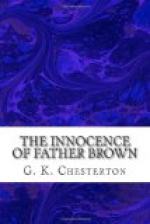“Well, that’s all I can tell you about the new religion,” went on Flambeau carelessly. “It claims, of course, that it can cure all physical diseases.”
“Can it cure the one spiritual disease?” asked Father Brown, with a serious curiosity.
“And what is the one spiritual disease?” asked Flambeau, smiling.
“Oh, thinking one is quite well,” said his friend.
Flambeau was more interested in the quiet little office below him than in the flamboyant temple above. He was a lucid Southerner, incapable of conceiving himself as anything but a Catholic or an atheist; and new religions of a bright and pallid sort were not much in his line. But humanity was always in his line, especially when it was good-looking; moreover, the ladies downstairs were characters in their way. The office was kept by two sisters, both slight and dark, one of them tall and striking. She had a dark, eager and aquiline profile, and was one of those women whom one always thinks of in profile, as of the clean-cut edge of some weapon. She seemed to cleave her way through life. She had eyes of startling brilliancy, but it was the brilliancy of steel rather than of diamonds; and her straight, slim figure was a shade too stiff for its grace. Her younger sister was like her shortened shadow, a little greyer, paler, and more insignificant. They both wore a business-like black, with little masculine cuffs and collars. There are thousands of such curt, strenuous ladies in the offices of London, but the interest of these lay rather in their real than their apparent position.
For Pauline Stacey, the elder, was actually the heiress of a crest and half a county, as well as great wealth; she had been brought up in castles and gardens, before a frigid fierceness (peculiar to the modern woman) had driven her to what she considered a harsher and a higher existence. She had not, indeed, surrendered her money; in that there would have been a romantic or monkish abandon quite alien to her masterful utilitarianism. She held her wealth, she would say, for use upon practical social objects. Part of it she had put into her business, the nucleus of a model typewriting emporium; part of it was distributed in various leagues and causes for the advancement of such work among women. How far Joan, her sister and partner, shared this slightly prosaic idealism no one could be very sure. But she followed her leader with a dog-like affection which was somehow more attractive, with its touch of tragedy, than the hard, high spirits of the elder. For Pauline Stacey had nothing to say to tragedy; she was understood to deny its existence.




